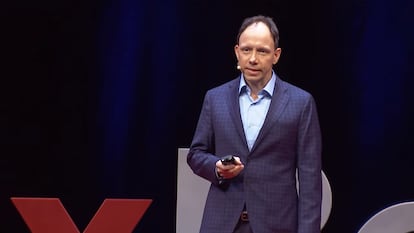Steve Horvath: ‘I’d like people to have the choice of whether they want to die, as opposed to it being prescribed by nature’
The aging expert and University of California researcher is currently working for Altos Labs, a company specialized in rejuvenation financed by billionaires like Jeff Bezos


Steve Horvath was 17 years old when he decided that he wanted to travel through space. He soon realized that going as far as he intended takes, at best, a few hundred years, so he shifted his focus to a new challenge: aging. In 2011, the researcher from the University of California, Los Angeles, proposed a method to measure biological age through chemical markers in the DNA that modify genetic expression. The process, known as DNA methylation, was named the Horvath clock. The scientist now works for Altos Labs, a company specialized in rejuvenation financed by billionaires like Jeff Bezos that offers considerable compensations to its researchers. “I’m no longer interested in space travel at all. I wouldn’t leave. I like planet Earth. But I’m still interested in this issue of prolonging our lifespan,” he says via video call, in conversation with EL PAÍS.
Question: Why are we so fascinated by aging?
Answer: For the first time in history, we may really have a rational approach to do something against it. People were always obsessed with aging and death. In the past people were very religious. Why? Because they were worried about death and disease, and one avenue to deal with this anxiety about our mortality is religion. And many people in the past were driven to become famous, to reach some sort of a sense of immortality. Let’s say on the battlefield; they wanted to become Alexander the Great or Caesar the Conqueror. And why? Because they wanted people to remember them. It’s, again, an impulse against mortality. A lot of human behavior in the past was very much driven by this concern.
Q. And now?
A. Nowadays we do see in certain ways that it might be possible to have interventions that extend our healthy years. Many people follow influencers on social media that give advice on lifestyle, anything from intermittent fasting to certain exercise routines. But everyone understands that lifestyle will not lead to drastic increases in healthy years. You may gain five years or whatever the number is, but it won’t be 50. And many people simply cannot exercise or follow a healthy lifestyle, for whatever reason, and they would like to have drugs to help.
Q. Is it difficult to study aging?
A. Many researchers will say that aging is the most complicated of all conditions, because all organs go downhill. Kidneys go down, brain, skin, everything declines, so it feels that aging is very complicated. But I actually have the opposite opinion. I feel that studying aging is remarkably easy. Aging processes relate to developmental processes, and they are very deterministic. We can measure it very well, we can study it. So I feel we will understand aging quite well.
Q. Is biological age the same as chronological age?
A. When people talk about biological age, they want to say that some people are much older than they should be, or conversely, some people are much younger than they should be. For example, I have a father-in-law, and he’s 92 years old. And when we go on a hike, he walks faster than me. Everybody knows an older person who is remarkably fit. And conversely, everybody has a friend of the same age that, for whatever reason, suffers from many conditions. So people have this intuitive sense that your chronologic age, or calendar age, doesn’t capture how fit you are, physiologically.
Q. How is biological age measured?
A. Many different approaches. One is based on proteomics; you measure blood proteins. In my work, we focus on DNA molecules because we feel that these changes to the DNA are one of the root causes of why we age.
Q. Why?
A. Imagine you have a person, and this person lives, let’s say, in Valencia. Perfect weather, always utterly relaxed, no stress whatsoever. Exercises, runs on the beach every day, meditates and has a healthy diet. This person will still age and die. And the question is, why will they do that, even though they do everything right? And the answer is that there is an innate aging program. It’s in all of us. We cannot influence it with lifestyle or by reducing stress.
Q. What do you think about the proliferation of companies that offer biological age estimation?
A. I went to a conference on longevity and rejuvenation, and there was a speaker that said that half of all longevity clinics and health clinics now measure methylation age. I had two emotions about it. First I was actually happy because, I mean, that was my dream in 2011 when we developed these saliva epigenetic clocks, that people would find it useful. Also, I’m a big believer in empowering people to measure things. I people to have access to this information. But the second emotion was fear. My fear is that some of these measurements are simply misleading, anybody can offer an age measure, but maybe it’s not scientifically validated.
Q. What impacts might this have?
A. There’s a great danger that somebody goes to a company, measures something, then gets an answer they don’t like and gets depressed or upset. Imagine you’re 50 years old; you measure your age and it says that your biologic age is 60. Some people will be very worried and say, “Oh my God, I will die quickly.” That’s one of the reasons why I give interviews: I want to tell the public that whenever you get a biologic age estimate, you don’t translate it one to one to life expectancy. Let’s say that a 50-year-old has a biologic age of 60; that doesn’t mean that your life lifespan is 10 years shorter. It’s a nonlinear relationship.
Q. So what influences aging more, external factors, such as diet or pollution, or the “programming” in our DNA?
A. When you talk about aging, you will get different answers. One group of researchers will say: we age because our mitochondria decline. Another group will say: we age because the garbage disposal in our cells doesn’t work. And then you have people who will say that the communication between organs breaks down, signaling, hormones. When researchers meet, they have these debates — what comes first, what is most important? I wouldn’t say epigenetics [changes in DNA due to age or environmental factors, for example] is the most important, because I just don’t know. But I will say that nobody doubts that epigenetics does play an important role.
Q. Is DNA programmed to prevent us from living longer and longer as we evolve?
A. Is there an upper limit? My answer would be yes, there is, if you follow what one would call natural aging. Will there ever be a person that lives 200 years because they follow a good lifestyle? No, I don’t believe it. But the second answer is: if you have interventions that restore the young methylation or, more broadly, the young epigenetic profile, then yes, they could live longer, for sure.
Q. Why is it so difficult to create anti-aging drugs?
A. There are many risks. Any medication has certain side effects. There’s nothing that is 100% safe. For example, with the Yamanaka factors [specific DNA sequences that, if activated from the outside, initiate a process that transforms a mature cell into a stem cell, rejuvenating it], the great danger is cancer. Then, many people are interested in rapamycin, it’s very fashionable in the aging field. I don’t take it for myself because it suppresses your immune system. And then other people are very interested in using anti-diabetic drugs, so you will hear a lot about metformin. But unless you have high blood glucose, for an average person there could be side effects.
Q. The figure of billionaire Bryan Johnson — who invests millions of dollars a year in returning, biologically, to the age of 18, to the point of receiving blood plasma from his teenage son — has become very popular in the media.
A. I certainly admire him for several reasons. He’s very dedicated. And he’s very disciplined, he eats the same meal every single day. Think about how hard that is, it requires tremendous discipline. I think he started some rejuvenation Olympiad, and that’s how I think of him: as an Olympic athlete.
Q. What do you think about injecting blood to rejuvenate?
A. Young blood really does regenerate multiple organs in mice and in rats. Even in humans, we have evidence that young blood plasma also rejuvenates them; weaker evidence. The effect is less pronounced. In rats, we published a paper where we found that there was an age reversal of up to 50%. But in humans, the age reversal based on young blood is much lower. More like two years or so. I think scientifically it’s interesting. Would I do it personally? Not sure yet, you know, but I don’t want to say no to it.
Q. What will we see in the field of aging in the coming years?
A. The exciting thing is that many leading researchers have entered the field. There’s a tremendous interest in this, that drugs will be developed. There’s also significant investment in the field. My hope is that one of the companies that pursue rejuvenation will actually succeed, and then all of us will benefit.
Q. Until what age do you think we will live?
A. I think we should have a reasonable goal. Not longer years, but healthier years. So instead of you developing dementia at age 85, I would like that people develop it at age 90, or instead of getting diabetes at 75, you get it at age 80. To improve healthy living by five years. I would like that people ultimately have the choice of whether they want to die, as opposed to it being prescribed by nature. For me, the best society would allow people to make the decision when they want to die. That’s utopia.
Sign up for our weekly newsletter to get more English-language news coverage from EL PAÍS USA Edition
Tu suscripción se está usando en otro dispositivo
¿Quieres añadir otro usuario a tu suscripción?
Si continúas leyendo en este dispositivo, no se podrá leer en el otro.
FlechaTu suscripción se está usando en otro dispositivo y solo puedes acceder a EL PAÍS desde un dispositivo a la vez.
Si quieres compartir tu cuenta, cambia tu suscripción a la modalidad Premium, así podrás añadir otro usuario. Cada uno accederá con su propia cuenta de email, lo que os permitirá personalizar vuestra experiencia en EL PAÍS.
¿Tienes una suscripción de empresa? Accede aquí para contratar más cuentas.
En el caso de no saber quién está usando tu cuenta, te recomendamos cambiar tu contraseña aquí.
Si decides continuar compartiendo tu cuenta, este mensaje se mostrará en tu dispositivo y en el de la otra persona que está usando tu cuenta de forma indefinida, afectando a tu experiencia de lectura. Puedes consultar aquí los términos y condiciones de la suscripción digital.








































